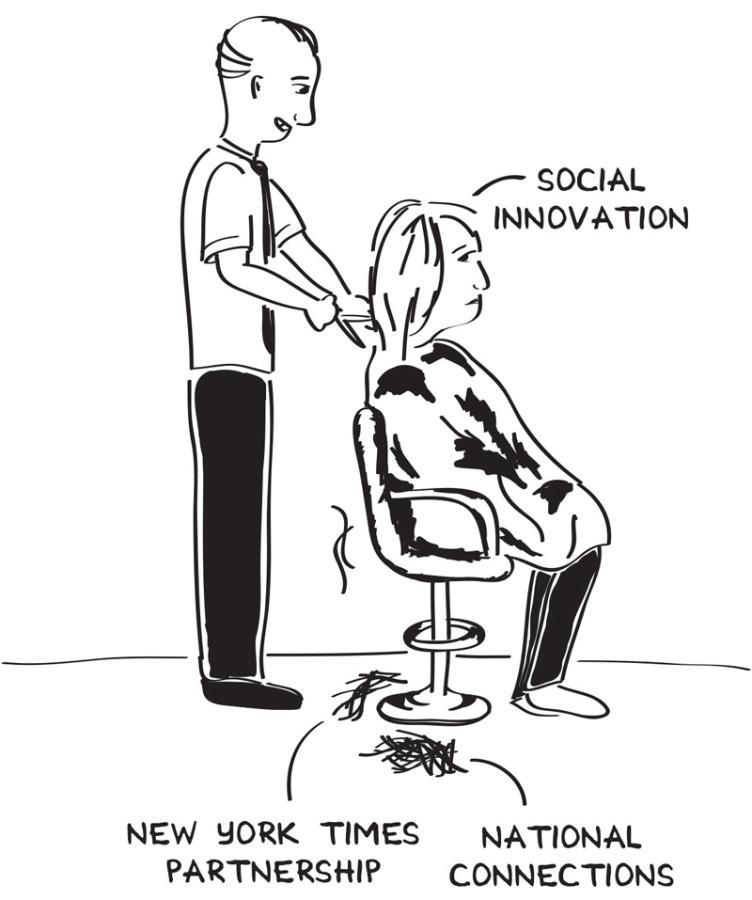Marquette received a $100,000 grant from a Bill and Melinda Gates Foundation’s initiative, Grand Challenges in Global Health, to help jump-start its new FixesU partnership with the New York Times.
Marquette was one of 10 recipients out of the 1,000 grant applicants in 85 countries.
Jeff Snell, special adviser to University President the Rev. Scott Pilarz, is a leader of the university’s Social Innovation Initiative and a chief player in Marquette’s attaining of the Gates’ grant. Snell said the $100,000 grant from Grand Challenges will be used to gain external expertise, develop the website and for administrative purposes.
The Marquette-New York Times FixesU partnership will work together to create a Wiki-style website to host “solutions journalism” stories as resources for educational instructors to use in their curriculum.
“This unique partnership offers an opportunity to live out our deep commitment to serving others and finding solutions to society’s greatest needs,” Pilarz said on the university’s Social Innovation Initiative website.
Solutions journalism is a type of reporting that covers how citizens and organizations confront social problems through creative initiatives and programs. Instead of zeroing in on the repercussions of social issues, solutions journalism aims to provide answers to these issues, which blight society.
The FixesU partnership was inspired by both the New York Times’ “Fixes” column and the inner workings of Marquette’s Social Innovation Initiative office, which aims to encourage new and innovative solutions to social problems.
“You don’t have to accept things the way things are,” Snell said. “You can actually step out and be your own solution to the problem.”
Each “solutions journalism” article can be viewed as a miniature case study for solving a problem specific to an academic discipline, said Snell. From chemistry to social justice, Snell believes all academic areas can benefit from articles on the Fixes platform.
“What areas will problem-solving not be applicable?” Snell said. “I’m hard-pressed to answer that.”
The website will also allow users to upload their own content to contribute to the educational discussion. For example, educators may upload student projects, lesson plans or a reading list that pertains to a specific case study, said Andrew Brodzeller, senior communication specialist for Marquette’s Office of Marketing and Communication.
Snell also said they will use this money to incentivize educators to use the website.
“You use that little mini case study – and you find it on the little wiki-style digital platform that we’re building with the Gates money – and you download it or you send a link to your students, they read it, they like it,” Snell said. “You have a discussion, and maybe you develop a PowerPoint or a Prezi to use as part of the instructional aspect of it – and you upload that (to the FixesU website), so you capture what works well with your students.”
Snell emphasized that the content users upload to FixesU has the capacity to be shared with instructors all over, creating a network of educators.
The New York Times’ Fixes column offers solutions to a variety of issues, from homelessness to clothing scarcity in India’s rural areas. It is written by Tina Rosenburg, author and contributing writer for New York Times magazine, and David Bornstein, author and guest speaker at Marquette’s annual Burleigh lecture in September.
Rosenburg and Bornstein’s columns will be the primary contributors to the site. However, the site will also feature case studies and articles from other relevant sources as well, Snell said.
The website will initially be intended for the Marquette community, then expanded for use by the 19 schools recognized as “changemaker campuses” by Ashoka U, a higher education organization dedicated to social entrepreneurship and innovative education. Other “changemaker campuses” include Middlebury College, Brown University, Duke University, Cornell University and Arizona State University.
A preliminary, beta website is expected to be “up and running” by January 2013, Snell said. A modified, more complete version will be published roughly a year from now.


